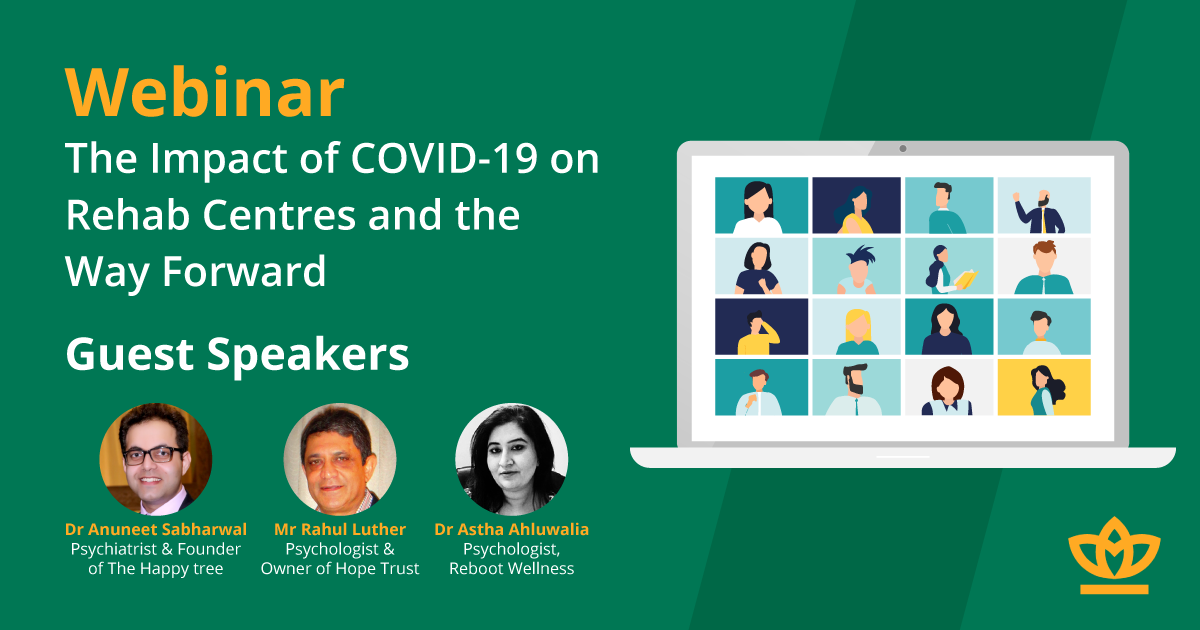Webinar – The Impact of COVID-19 on Rehab Centres and the Way Forward

In our weekly webinars, we talk about various industry scenarios and challenges of rehabs across the country along with the de-addiction and mental health challenges faced by the mental health community and people in general.
In the first webinar of the series, we invited Dr Anuneet Sabharwal, psychiatrist and founder of The Happy Tree, Dr Astha Ahluwalia, a psychologist at Reboot Wellness, and Mr Rahul Luther, psychologist & owner of Hope Trust. The webinar was hosted by Mr Vikram Kumar – Managing Director of RehabPath, India. In the webinar, Dr Sabharwal, Mr Luther & Dr Ahluwalia share their views on the impact of COVID-19 on rehab centres and the way ahead.
In this blog, you can read the summary of the webinar, or you can watch it online here.
Vikram: Please tell us more about you and your work.
Mr Rahul Luther: I’m the founder-director of Hope Trust. I founded it 18 years ago in 2002 as a luxury facility. At Hope Trust, we focus more on quality and ethics. Today we not only have inpatient and outpatient facilities for addicts, but we also extend them to psychiatric and psychological patients. We provide integrated programs, i.e., psychiatry, psychology, 12-step program facilitation, with yoga and mindfulness.
Dr Anuneet Sabharwal: It’s been almost ten years now that I’ve been in the field of mental health. My tryst with mental health started during school days when I chose to study psychology. Currently, I’m working on constructing my psychiatric nursing home based on hardcore medicine. My primary focus is neuromodulation or brain stimulation, where I find both interest and benefit. At my clinic, we have state-of-the-art equipment imported from various parts of the globe, especially the ones that only a licensed practitioner can get his hands-on. Once ready, the psychiatric nursing home will have 31 beds for patients related to detoxification, comorbidity, and sexual health.
The procedure we often use for the treatment of our patients is known as tDCS – Transcranial Direct Current Stimulation. Another effective treatment method that we use is called brainwave entrainment. We also do psychotherapy enhanced with NIBS – Non-Invasive Brain Stimulation. During the treatment process, you will be hooked to a device that will get you more relaxed.
Dr Astha Ahluwalia: I run a mental well-being and de-addiction centre known as Reboot Wellness in Gurgaon. It is primarily a therapeutic and counselling centre. We also provide pre and post de-addiction support to our patients. Our facility is mostly outpatient, so we have a team of professionals for it. Many of our clients who come here to interact in a cohesive environment are provided with a cafe-like environment which facilitates social interaction. We also have tie-ups with several deaddiction centres. Reboot Wellness also hosts many support groups and fellowship meetings, including AA, NA and CODA.
Vikram: Mr Luther, you have been part of the industry for a long time now. What is your view on the effect of COVID-19 on the operations of mental health facilities in India both long-term and short-term?
Mr Luther: We are operating in a dynamic environment. What we can start doing is to create a safe and hygienic environment for the residents in all the centres. We can minimise interactions with the outside world. Our centre is following recommendations and guidelines of various global organisations. For outpatients, we offer online counselling sessions. Businesses are likely going to take a hit. Fear in families, staff members, patients, and every other person persists. Fear is also accompanied with anxiety, OCD, and similar other things. We give greater importance to ethics than money. We have stopped taking new admissions for now to ensure the safety of our patients. For the long-term situation, we cannot say anything. As far as I can understand, people will continue using drugs, especially alcohol. But we must keep our ethics intact.
Vikram: How do you see the current situation affecting the mental health of the general public?
Dr Sabharwal: I was interviewed recently for the same by TV9. Fortunately, and unfortunately, we have all these gadgets that can help us stay distracted. We can connect with anyone. I would like to look at this COVID-19 lockdown as an opportunity to communicate with people with whom we haven’t talked for a while. We can put our grudges aside and connect. If they are unable to do any of this sort, we are looking at a major mental health crisis.
Vikram: How do you see people coping with this situation without physical access to a psychologist?
Dr Ahluwalia: In the last couple of days, we have seen an increase in the number of distress calls. People are facing anxiety due to social restrictions. At Reboot Wellness, we have put all our sessions online. We have also conducted group sessions along with giving our clients access to sessions through emails. Two things that I have noticed during this time are – change in perspective around mental health because everything has slowed down and the widespread stigma around it. We get many enquiries regarding anxiety for which we are taking online sessions as per our capacity.
Vikram: One big challenge that psychologists are facing today is the impossibility of conducting in-person sessions. Are online sessions sufficient for a patient?
Dr Ahluwalia: I would not use the word sufficient for online sessions, but they are definitely an option. We can not replace the human touch, which is crucial in the work we are doing. Keeping in mind the current situation, the realisation regarding tech-based intervention will make it more acceptable.
Vikram: What are some of the significant challenges that rehab centres are facing as a result of Covid-19?
Mr Luther: I look at the current situation as an opportunity rather than a challenge. We can educate the client and their families about COVID-19 and help them get rid of fear, anxiety, and other mental health issues. As far as business is concerned, there is uncertainty.
Vikram: Many AA meetings have been cancelled due to the pandemic. Do you see AA meetings taking the online route?
Dr Ahluwalia: One of the things of being a part of a fellowship is to know, recognise and realise that you have support. Though the format includes an in-person meeting, it can be conducted virtually. Many AA and NA groups have taken up sessions virtually.
Vikram: Is there any common platform for AA and NA meetings that people can find online easily?
Mr Luther: Online meetings have always been there. However, they’ve not been popular in India. Many meetings happen every day globally, be it CODA, Narcotics anonymous, nicotine anonymous, or any other.
Dr Ahluwalia: All these groups also have chat rooms where you can log in and join to attend the session or share thoughts.
| Note – If you are looking for a reliable, authentic, & unbiased information related to rehab centres providing online counselling and therapy across India, you can find the information here. |
Vikram: How do you perceive the role of the state or the central government specifically regarding mental health?
Mr Luther: The government is taking progressive steps in the field of mental health. Rehab centres across the country are getting licenses, which was earlier only done by the Punjab government because of drug problems their state was facing. After the introduction of the Mental Healthcare Act, 2017, all the rehabs now require a license to operate. Since all the rehab centres now come under this Act, they are required to meet every guideline of a psychiatric facility. The government is initiating, but there is still a shortage of psychologists and psychiatrists in India.
Vikram: How should the rehab centres and mental health facilities prepare for the future?
Dr Sabharwal: Many rehab centres are still living in the past. They have guidelines stating that a patient should be admitted for a period of six months. We, as species, have evolved to become faster and more efficient. People give greater importance to time than anything else. Globally, there is a significant decline in the admission of patients for all illnesses. What we are going to do in my upcoming psychiatric nursing facility is to have detox with ultra-short or short rehab. For many families, the first interaction with rehab can be traumatic, which does not assure them of their child’s well-being. This approach needs to be changed. If we look at the SMHA website today, they have categorised different kinds of psychiatric facilities. In my opinion, short-term treatment procedures are in-demand, which is where we come into the picture. We are not looking at ‘healing’ but detoxification in a short span where the patient is good to go on track. If we keep them admitted for too long, say six months, it will be difficult for them to get back to work. There are pros and cons to every approach. We have to look at the future and change the status quo.
Vikram: What is your opinion on involuntary admissions in the rehab centres where the patient might not be lucid?
Dr Sabharwal: Unethical and bordering on illegal.
Mr Luther: I second that. We have also stopped accepting involuntary admissions. All the patients have to sign a consent form now. Apart from the legality, the entire delivery of treatment gets easier if the patient has the required motivation. If a person doesn’t want to stay in the rehab centre, he is free to go as we don’t hold them back physically.
Vikram: Involuntary admissions have also become illegal, but sometimes the family of the addict feels helpless. What are your views on it?
Mr Luther: It is why we prefer talking to the family before talking to the patient. We need to empower and train them for intervention as they must recognise codependency. If they want their child to change, the family must change too.
Dr Ahluwalia: We follow a similar approach at Reboot Wellness. Since we provide pre- and post-rehabilitation support, many of our patients send queries for not going to rehabs. Sometimes they feel helpless. We also address comorbidities, if any, and try to address them. We encourage families to bring a change in their environment.
Dr Sabharwal: One of the reasons I have not done any cyber-counselling is because I’m a firm believer in face-to-face contact. I like to think that it can never be replaced. The current scenario is not ordinary, so we can think of all these virtual alternatives, but not in usual scenarios. Since I’ve only been in a hospital scenario, I have a little idea of how communities manage all these things at large. I’d like to ask other panellists’ how they get people to join all these groups or sessions.
Mr Luther: These self-help groups are entirely independent. They are associated with neither any organisation nor us. People have to join them voluntarily, pay a small fee, and keep their name anonymous. We don’t look at these facilities from a business perspective. After the treatment, the patients who attend these meetings have higher chances of staying in recovery. If a person has relapsed many times in the past, then only we use medicines.
Dr Ahluwalia: Fellowship meetings that also include alcohol anonymous are self-supportive groups. AA is almost 100 years old concept. They are a voluntary group where people come together and follow 12-steps to stay on the road to recovery. We provide them with a space to come together. We also encourage people to join these meetings who don’t want to engage with a therapist or pay fees. We encourage people to be a part of this community and support each other. We also keep a minimal rent to host such supporting facilities.
Vikram: How can we help people who cannot afford a good de-addiction centre?
Mr Luther: Every de-addiction centre follows a different standard like the medical model or the integrated model. The cost varies depending on the level of comfort a person wants. Unfortunately, our government doesn’t provide this facility, that’s why most rehabs are private. You can find rehab centres as per your budget and needs.
Dr Sabharwal: As far as affordability is concerned, I’m aiming at giving equal treatment to all irrespective of where they come from. We will be following a model where they can get add-on facilities like counselling, neuromodulation, and similar others.
Dr Ahluwalia: At Reboot Wellness, we also provide many facilities at a minimum or no cost to meet patient requirements, like giving space to AA groups or counselling for our outpatients.
Vikram: Is there any message that you would like to give to our audience?
Dr Ahluwalia: These are challenging times. It is normal to feel anxious. It is why one should focus more on mental health. Do yoga, spend time with your family, have a routine, use every corner of your house for moving around. Though physical help is not possible currently, you should still seek help through various other modes.
Mr Luther: My message would also be to seek help. Physical consultation is definitely required, especially for doctors. Whenever you have any substance abuse or mental health issue at home, try to find help. Confidentiality issues can be taken care of by professionals.
Dr Sabharwal: If you have tried everything in the book, give brain zapping a chance.
If you have any other substance abuse problem, get help as fast as you can. Go to your nearest psychiatrist or a rehab centre and get the help you need. All the rehabilitation centres are open.
For more webinars like this, follow us on Facebook.











